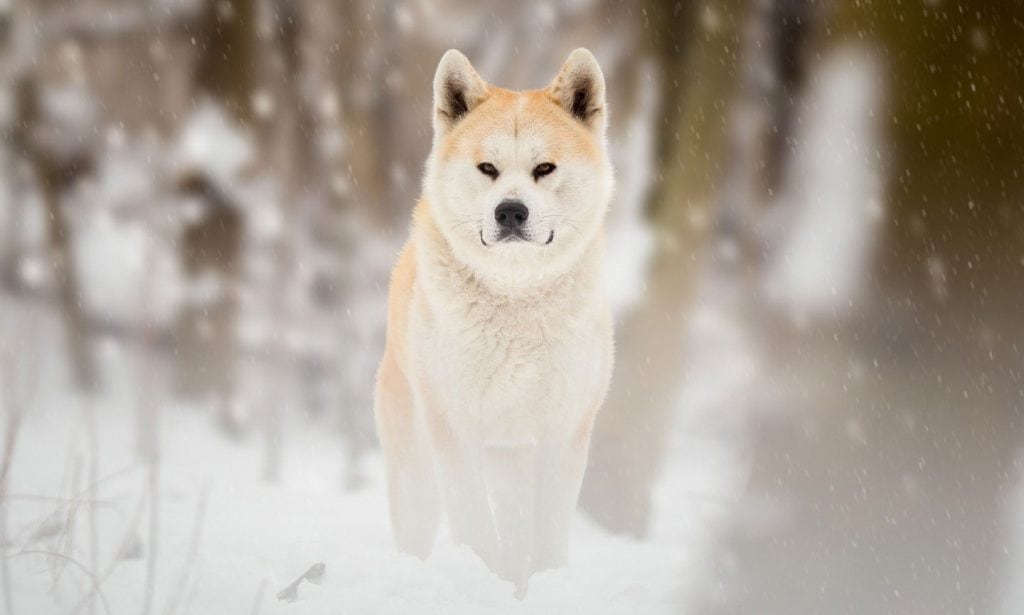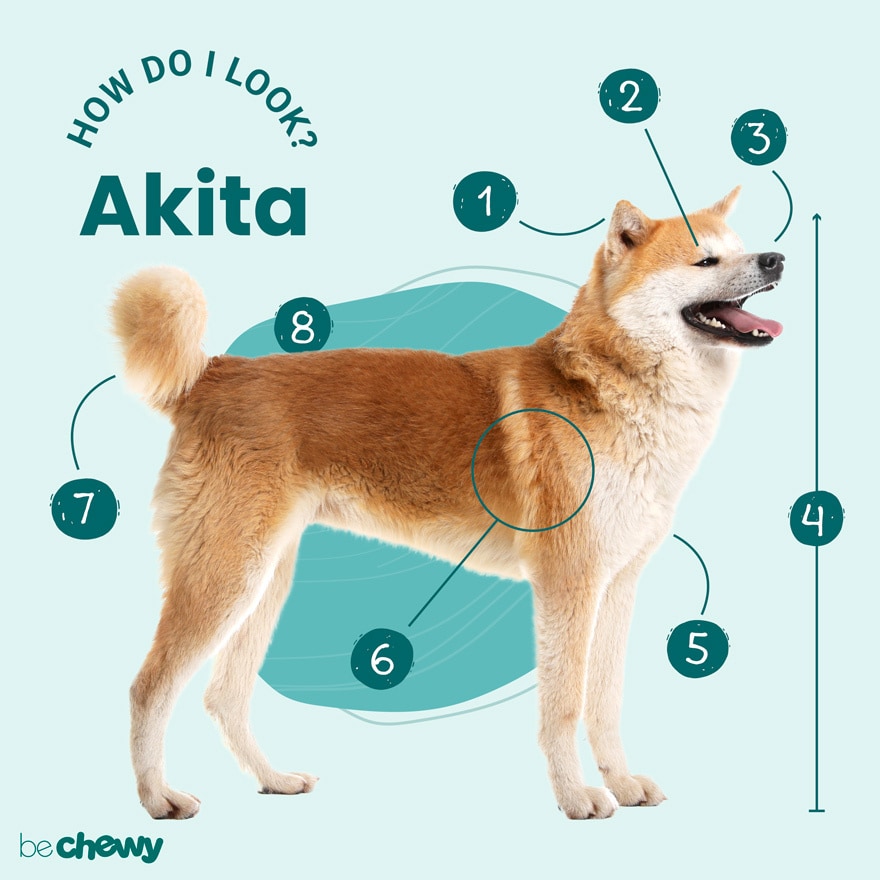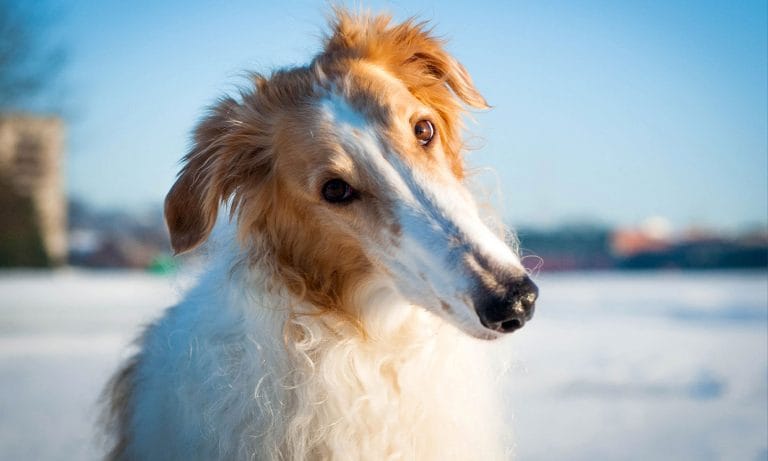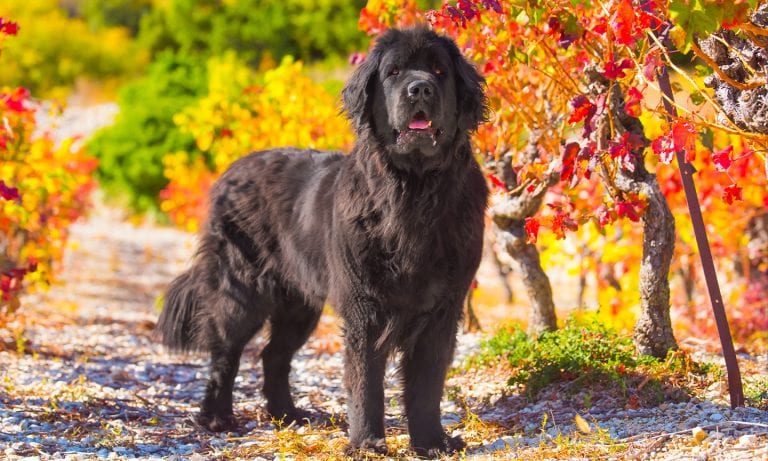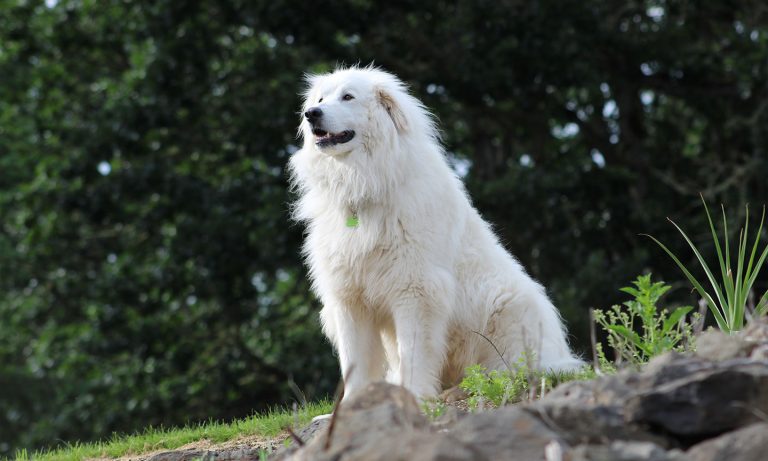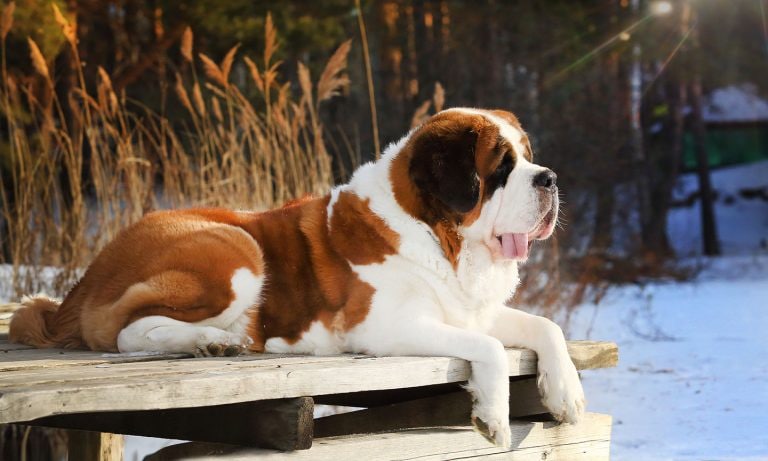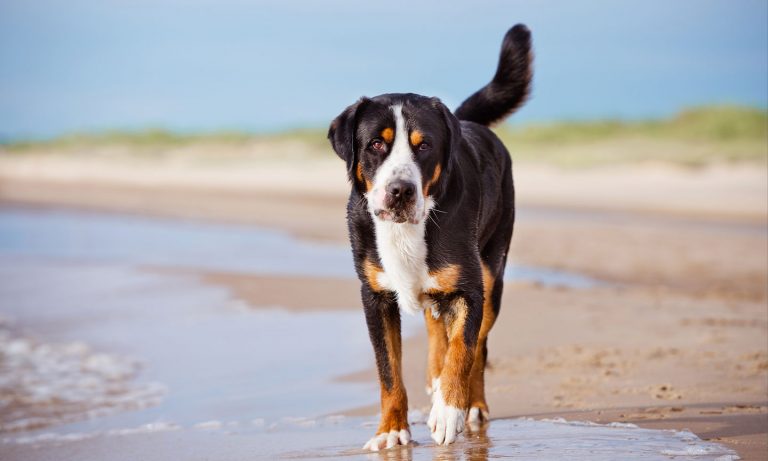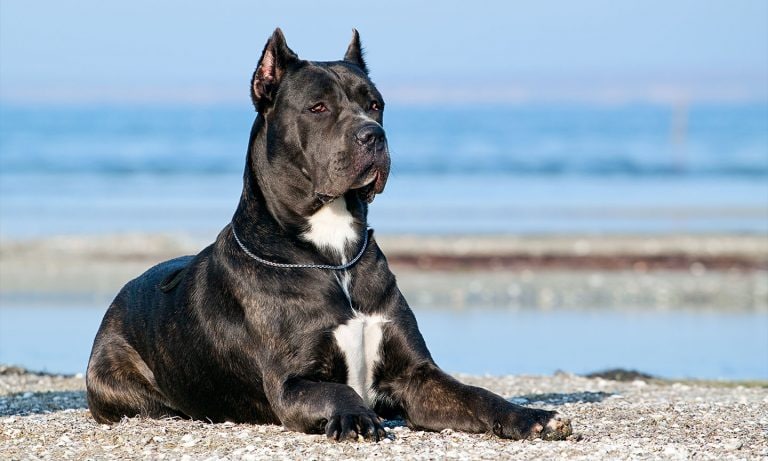If you secretly get excited when someone cancels plans or if you prefer the company of a few good friends over large social gatherings, then the Akita may be the dog for you. This independent, quiet breed is a bit of an introvert and would enjoy lying low on a Friday night just as much as you. Loyal and protective, they bond deeply with their family and can be wary of strangers, making them natural guard dogs. Not the most social of breeds, they prefer to show their softer side to those they love the most. But hey, who needs a big crowd when you have each other?
Breed Snapshot
Temperament:
IntelligentIntrovertLoyalCoat Color:
BlackBrownFawnRedWhite
Best For
Akitas are best for homes with experienced pet parents who don't have other pets or small children. They'll thrive in any sized home as long as they get long daily walks and plenty of quality time with the people they love.
Akita Temperament
Quiet and dignified, Akitas are loyal dogs who love spending time with their families. They’re intelligent and fairly energetic, so they’d enjoy both mental and physical activities like going on long walks together or solving doggy puzzles.
Social butterflies they are not. Akitas often feel cautious around strangers. Because of their more aloof personality, they’ll benefit from extra socialization and training while growing up. Still, it’s best to supervise them closely around other pets or young children, especially once your pup is fully grown. Thanks to their protective instincts, they may misinterpret play as an attack and try to intervene, thinking they’re being helpful. They may actually do best as the only pet in a home without small children or babies around.
Speaking of being protective, the Akita is known for their guarding ability—it’s one of the jobs they were bred to do. And their strong bite force is one of the tools they have to protect their family. While not every Akita may ace guard dog school, they all naturally be protective of you and your home and will monitor what’s going on while they’re spending time with you. A good pup parent will provide proper training and socialization to ensure their dog knows the difference between a foe and friend, and will recognize the need to keep their pup out of situations where they might mistakenly feel the need to be aggressive.
How to Care for a Akita
Akitas thrive when they get lots of socialization as puppies so they can be well-adjusted, happy adult dogs. They need extra grooming when the seasons change but are surprisingly adept at keeping themselves clean. You’ll want to be cautious if you’re around strangers since they can be guarded and aloof. The good news is they’ll adapt wonderfully to a small or large home as long as they can expend their energy going outside with you every day.
Akita Health
Akita dogs have a life expectancy of 10 to 13 years, but the breed does have a few health issues you’ll want to watch out for to give them the longest lifespan possible. The best preventive measure is working with an Akita breeder who screens for all these issues. Ask to see the test results of the litter you’re considering. If you’re rescuing your Akita from a shelter, make sure you get a copy of the dog’s wellness check.
- Hip Dysplasia: The Akita is a large breed in size and weight, so they are prone to hip dysplasia or other joint issues. Although hip dysplasia isn’t preventable, you can get your Akita’s hips tested. One of the key factors in reducing the effects of hip dysplasia is to keep your pup at a healthy weight. Ask your veterinarian if a supplement like glucosamine would be helpful or if there are any exercises to help keep the dysplasia from affecting your dog’s quality of life.
- Progressive Retinal Atrophy: Akitas can have eye problems. PRA is a genetic condition that can cause Akitas to go blind. Unfortunately, there’s no cure. If caught early, you can have more time to prepare for and adjust to the condition.
- Von Willebrand Disease: The Akita breed can develop von Willebrand Disease—a bleeding disorder where the blood doesn’t clot well. If the dog loses a significant amount of blood, a transfusion is often needed. Your veterinarian can test your dog for this and help you know what
precautions need to be taken, like avoiding medicines that inhibit
clotting (aspirin) and keeping wound glue handy in case your pup gets a
cut. - Gastric Dilation and Volvulus: GDV is a life-threatening condition that Akitas are more at risk for developing because of how deep and narrow their chests are. GDV occurs when the stomach is distended with gas and twists on itself. It can sometimes require surgery. Watching the speed at which your dog eats and ensuring they don’t exercise too close to mealtime can help.
- Immune Disorders: Akitas are prone to several immune system disorders, including myasthenia gravis. This can cause weakness and fatigue. Your veterinarian can help you determine the best treatment options.
- Sebaceous Adenitis: Akitas can also develop skin-related immune disorders, like sebaceous adenitis. It can cause irritated skin, hair pigment changes, and patchy hair loss. This can lead to skin infections if left untreated. Treatments range from omega-3 supplements and special shampoos to mineral baths and antibiotics. Talk to your veterinarian if you notice any symptoms.
Akita History
The Akita’s origin is from 17th century northern Japan when a banished nobleman was seeking to breed a loyal hunting dog. The Akita was bred to have characteristics that helped them hunt deer, boar and even local bears. The breed was close to extinction a few times; today, it’s seen as a symbol of health and happiness in Japan.
Helen Keller brought the first Akita to the United States after she was gifted one while visiting Japan in 1937. Although World War II slowed the breeds’ introduction to the United States, some soldiers brought Akitas back with them when they returned home.
The Akita was officially recognized by the AKC in 1972 when the breed entered the AKC’s Stud Book; they joined the Working group in 1973. (The dogs in this group were all bred to do specific jobs, like hunting or pulling sleds). Currently, there are two main types of Akitas: the more commonly known American Akita (or just Akita) and the Akitainu (meaning “dog”), also called the Japanese Akita. The AKC considers these two separate breeds: the Akita and the Japanese Akitainu.
Where is the best place to find Akita puppies today? You can find a list of reputable Akita breeders on the American Kennel Club’s website. The average Akita price can be anywhere from $600 to nearly $2,000 for an Akita puppy, depending on the breeder, pedigree papers, and any health or temperament screenings performed. An Akita puppy with prize-winning parents might even cost up to $4,000. Akita rescue organizations can also help you find a purebred, or you can check your local shelters for Akitas to adopt.
FAQs
Do Akitas shed?
Akitas shed a lot when the season changes from warm to cold or vice versa. They need daily brushing during this time. But outside of this, you only need to brush your Akita about once a week.
Are Akitas good with kids?
Akitas are good with kids if they are well socialized and trained. But they need to be supervised around young children. They may mistake play for aggression and try to intervene. They are more well-mannered if they’re raised around children and trained as a puppy, but it’s best to closely supervise Akitas when they’re with young kids and babies.
Are Akitas dangerous?
It would be easy to dismiss the Akita as dangerous. Akitas tend to be aloof and skeptical of strangers. If they’re pushed, they might act aggressively. It’s important to note that, in some areas, breed-specific legislation might even label them as “dangerous” and place strict regulations on them. But if you socialize and train Akitas from an early age, you can mitigate many unwanted behaviors. They still might be aggressive to other dogs or cats, so many thrive best as an only pet in a home that doesn’t have many strangers visiting.
Are Akitas good guard dogs?
Yes, Akitas are natural guard dogs. They will instinctively guard your home and monitor it protectively. But they love their family, so they don’t want to be stuck outside guarding alone. They can be an excellent guard dog living in your home, as long as you carefully manage the territorial tendencies that make them cautious of strangers and visitors.
What are the most popular Akita names?
Some of the most popular Akita names are Hiro, Yori, Yoshi, Sora, Kin, Michi, Sora, Hachiko, Tomy, Laila, Kimi, Natsumi, Yuzuki, Megumi, Jun, Akio, Taro, and Kazuki. Get more dog names here.
What are the most common Akita mixes?
The most common Akita mixes are:
- Akita-Husky mix (Huskita)
- Akita-German Shepherd mix (Akita Shepherd)
- Akita-Pitbull mix (Akita Pit)
- Akita-Labrador mix (Labrakita)
- Akita-Chow mix (Akita Chow)
- Akita-Rottweiler mix (Akita Rottie)
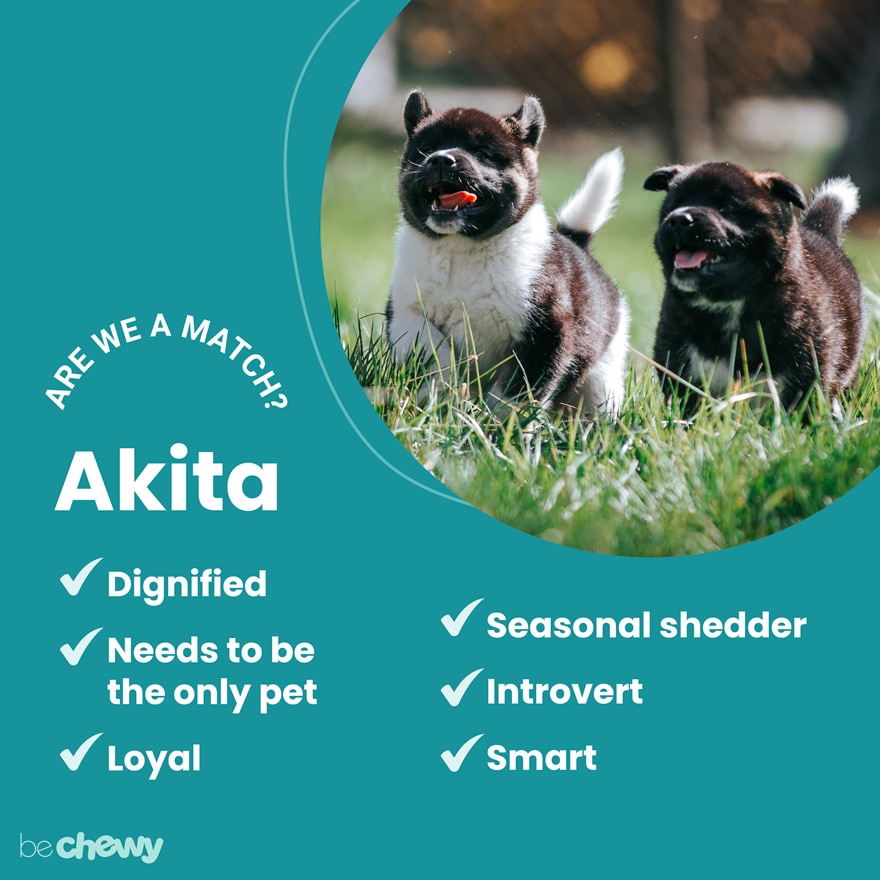
Top Takeaways
Akitas are loving, loyal pets who will happily provide you companionship and security. Most thrive best as an only pet in a home without young children, unless they’ve been well socialized. They may not love having strangers visit, but they make up for that in how much they love you.
Expert input provided by veterinarian Georgina Ushi Phillips, DVM, who writes the Not a Bully website, and certified dog trainer Irith Bloom, CPDT-KSA, CBCC-KA, CDBC, owner of The Sophisticated Dog.

Search for Adoptable Akitas Near You
Female Names
- Luna
- Bella
- Sora
- Athena
- Kuma
- Lilo
- Suki
- Yuki
- Akira
- Mochi
Male Names
- Kuma
- Bear
- Koda
- Zeus
- Yoshi
- Kobe
- Milo
- Thor
- Loki
- Max
Share:
